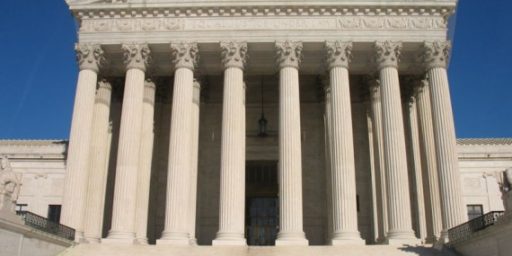ObamaCare’s Individual Mandate, And The Power Of Congress, Face A Test In Florida
The new health care law's individual mandate was the subject of another bruising court battle yesterday, but the real question in the room was what, if any, are the limits on Congressional authority?
Yesterday, a Federal District Court Judge in Florida heard oral argument in the multi-state lawsuit filed to have the Affordable Care Act’s individual mandate unconstitutional, and if the argument is any indication the Federal Government may be in for another defeat:
PENSACOLA, Fla. — A federal judge asserted on Thursday that it would be “a giant leap” for the Supreme Court to accept the Obama administration’s defense of a central provision of the new health care law, suggesting he may become the second judge to strike it down as unconstitutional.
In a three-hour hearing, the judge, Roger Vinson of Federal District Court, said the law’s requirement that most Americans obtain insurance, a provision that takes effect in 2014, would constitute “a giant expansion” of the court’s traditional application of the Commerce Clause of the Constitution.
“People have always exercised the freedom to choose whether to buy or not buy a commercial product,” the judge said, noting that he had been uninsured and paid out of pocket when his first son was born.
The hearing came on dueling requests for summary judgment in a lawsuit brought by governors and attorneys general from 20 states, all but one of whom are Republicans. Because of the plaintiffs’ prominence, the cases carry the most political weight of the roughly two dozen court challenges to the sweeping law.
The Supreme Court has held previously that Congress can use its Commerce Clause authority, which is among the powers assigned to the national government, to justify the regulation of “activities that substantially affect interstate commerce.”
Ian H. Gershengorn, a deputy assistant attorney general who is defending the law, told Judge Vinson that the health care market was unique because getting sick was both unpredictable and potentially bankrupting. The economic consequences of not having insurance — including cost-shifting to others — justify its regulation by Congress, he said.
But lawyers representing the state officials argued that the insurance requirement was unconstitutional because it would, for the first time, require citizens to buy a commercial product.
If the government is allowed such power, said David B. Rivkin Jr., who represented the state officials, the health law “would leave more constitutional devastation in its wake than any statute in our history.”
A similar argument was convincing to another federal district judge, Henry E. Hudson of Richmond, Va., who ruled Monday in a separate case that the health law left federal authority without “logical limitation.”
At one point in the arguments, Vinson questioned the government’s attorney on just how far they believed the Federal Commerce power extended:
PENSACOLA, Fla. — In a federal courtroom Thursday, Judge Roger Vinson questioned how far Congress’s authority would go if it can legally require nearly all Americans to purchase health insurance.
Could they “mandate everybody has to buy a certain amount of broccoli?” Vinson questioned, comparing the positive impact both could have on health. The comments came during oral arguments in the constitutional challenge 20 states have brought against the health reform law—just days after a federal judge in Virginia struck down the same controversial piece of President Obama’s signature legislation.
The federal government argued that health insurance and health care are unique markets and that Congress has the power to regulate them.
“It’s not shoes. It’s not broccoli,” said Ian Gershengorn, arguing for the federal government. “Health insurance is a product that is a financing mechanism.”
The problem, of course, is that once you say that the Interstate Commerce Clause means that the government can force you to purchase health insurance, or fine you if you fail to do so, then one really has to wonder where the limits of Congressional power really are. We’ve already had rulings from the Supreme Court that say that the Commerce Clause gives Congress the authority to regulate the production of wheat grown solely for individual use, the authority to require owners of public accommodations to treat all races equally, and to prosecute someone for growing marijuana for medicinal purposes in a state where medical marijuana is perfectly legal. However, as Brooklyn Law School Professor Jason Mazzone, upholding the individual mandate would require the Supreme Court to take the Commerce Clause down a road that would essentially mean that there are no longer any real limits on the power of the Federal Government:
Judge Hudson has presented a way for the court to finally answer this question. His opinion is the first prominent judgment to say that Congress can use its power over interstate commerce only to regulate “activity,” as opposed to a lack of action. This strikes many as a bold assertion, but it has a lot going for it. All of the Supreme Court cases upholding Congress’s power under the Constitution’s interstate commerce clause have involved Congress regulating some kind of activity that is already occurring.
Indeed, the court has never confronted a federal statute that forces people to engage in some action like this. The conservative justices in particular will no doubt wonder what else Congress can make Americans do if it can make us buy health insurance. Can Congress tell us to join a gym because fit people have fewer chronic diseases? Can Congress direct us to purchase a new Chrysler to help Detroit get back on its feet?
In addition, parsing the distinction between activity and inactivity provides a way for the justices to strike down the individual mandate without having to overturn any precedent. As shown by its ruling this year that corporations have a First Amendment right to pay for political ads, the Roberts court is masterly at generating new rules while saying it is faithfully following established law. Indeed, there is a hint that at least one member of the court already sees things in the same way as Judge Hudson. When the court held in 2005 that the interstate commerce clause permitted Congress to outlaw the cultivation and possession of marijuana for personal medical use, Justice Antonin Scalia wrote a concurring opinion that is a mini-treatise explaining why the relevant precedents commanded this result. In describing what Congress could regulate, Justice Scalia used the words “activity” and “activities” 42 times.
Judge Hudson’s critics say that a distinction between action and inaction is unworkable. After all, individuals who do not purchase health insurance engage in activity when they go to an emergency room for care. Yet a Supreme Court that for more than a century has struggled to define the limits of federal commerce power might, like Judge Hudson, refuse to find actions beyond the insurance market itself pertinent to an analysis of the law.
Judge Hudson’s distinction also has allure because United States law in other ways already treats actions differently from inaction. Criminal law punishes things people do, not things they do not do. Tort law makes us liable for our actions that cause injury; outside of special relationships like that between a parent and a child, there is no duty to act. To drive a car, you must first purchase insurance, but you can choose to forgo auto insurance and use public transport instead.
I still remain largely pessimistic about the odds that the Supreme Court will step in and tell Congress that it cannot do something because the Constitution doesn’t allow them to do it. With respect to the Commerce power, that’s only happened twice in the last 75 years, when it struck down most of the provisions of the Violence Against Women Act and the Gun Free School Zones Act. Will the justices have the guts to do it to a piece of legislation that was the result of a year of contentious political debate and which impacts nearly 1/4 of the entire economy? I don’t know, but if they do it could signal the beginning of a Constitutional revolution that will finally put some teeth back in a document that was meant to limit government, not empower it.







I hope for our country’s sake that they do. If this is not defeated there will be no limit to government power. At that point the Constitution will be meaningless. My hope is that at this point, the courts will realize what is at stake and come to their senses. If not, the battle for limited government because almost impossible to do the “nice way”.
“If not, the battle for limited government because almost impossible to do the ‘nice way’.”
Oh, do tell how the battle will be done in a not so “nice way”…1861, perhaps?
I think the way the law is being described is inaccurate, as i understand it doesn’t the law simply impose a tax on those who don’t get health insurance? if so then the “unconstitutionality” is simply a turn of a phrase since the government could just raise taxes and offer a credit to those with insurance (something that does past constitutional muster) and those who don’t would bear the extra burden making it exactly the same thing and bypassing the almost meaningless nonsense about activity vs inactivity.
But really idea that this law is somehow the gateway to unlimited government power is pure stupidity. The government isn’t even strong enough to fix basic problems like the banking system or challenge any large corporate organization with out that organization basically cutting off their allowance (campaign money). Right wing bed wetters are really starting to get tedious.
“a document that was meant to limit government, not empower it.”
Actually, that isn’t quite right. The Constitution was not written in reaction to the tyranny of the British Crown – it was written in reaction to the weakness of the Articles of Confederation. The goal in writing the Constitution was to strengthen the central government, not to weaken it.
” I don’t know, but if they do it could signal the beginning of a Constitutional revolution that will finally put some teeth back in a document that was meant to limit government, not empower it.”
Yeah, well, that’s your opinion.
Yeah, and it’s my opinion, too.
@Rick DeMent: Yes, Congress might have chosen to do that, but they did not. Instead, they said, ‘This is not a tax’ and rammed it through anyway. The law that passed makes the cost ‘not a tax’, which would have to go through various hoops and hurdles. Instead, it is a punitive fine on non-activity.
Even though I was educated by Jesuits, the level of casuistry that equates ‘activity = non-activity’ utterly bewilders me. If the government can tell me that I must engage in Economic Activity A, where is the line that prevents it from telling me that I must engage in Economic Activity B-ZZ”’? My not eating wax beansi surely affects the fortunes of an important aspect of America’s agricultural economy. Why can’t I simply be order to eat my wax beans or face a punishment? If the individual mandate survives, then I’m going to need some wax bean recipes. Or a new gun license.
The only two arguments the modern Right is capable of: The absurd slippery slope and the threat to start murdering people if they don’t get their way.
Thanks, John Burgess, for that excellent demonstration!
Of course, if we’re all required to eat wax beans, all of that goes into the crapper.
As shown here,
http://www.reuters.com/article/idUSTRE6A905U20101110
the number of people without health insurance continues to increase. Why conservatives are happy with this is beyond me. Yes, I know, James Joyner and others posting here continue to say they favor making health care available for everybody, it’s just that “ObamaCare” isn’t the right way.
Neither was “TrumanCare” or “HillaryCare”, and I suspect that if Ron Wyden’s insurance plan had gained any traction, “WydenCare” would be equally obnoxious. As I say, it’s beyond me.
About that wax beans thing.
Head over to Orin Kerr’s post at Volokh, Two Variations on “Could the Government Make You Buy A GM Car?” for Orin’s discussion and the comments. Pretty interesting.
> I hope for our country’s sake that they do. If this is not defeated there will be no limit to government power
Yet the right was silent on Bush’s torture, gulags, privacy invasions, and so on. They seemed unconcerned that the government have the power to make people vanish and then torture them, but the government saying that you can’t ignore the fact you need health insurance and then just stick the taxpayers with the bill if you are injured or get sick is the end of the republic.
Still talking insurance when the problem all along is costs. Pumping more money into the system will only continue to drive costs higher making insurance even more expensive regardless of how many new pool members.
Citizens should be most concerned with their own rights before those of captured combatants. In this the SCOTUS will likely intervene precisely because the stretching of the commerce clause impacts so much of the economy and nearly every citizen. It forces the question of where the limit should be drawn. It is so big it cannot be ignored by the court. The question of where the line is has been begging since Wickard. It’s not a slippery slope argument as much as clarification by the court.
I find it funny people speak of this law as some sort of well thought out piece of legislation while the reality is it was cobbled together and passed in an unorthodox manner. It’s junk. It won’t work and is likely unconstitutional.
“The problem, of course, is that once you say that the Interstate Commerce Clause means that the government can force you to purchase health insurance, or fine you if you fail to do so, then one really has to wonder where the limits of Congressional power really are. ”
Not really. Congress gave us the individual mandate because they couldn’t decide on anything better. Seems to me that their squabbling is a limit that even though it’s not codified, is something we can count on as a given.
And then there are the courts. Even if the Supremes uphold the mandate, they’re not going to turn in their robes and go home, saying to Congress, “Well, I guess that’s its. It’s all yours, guys.” No, they’ll still be there, foot on the brakes.
The reason the individual mandate exists is because the majority of people wanted the government to prevent insurance companies from denying covering for preexisting conditions. If you do that, you HAVE to have everyone buy insurance, or the free-rider problem could bring the industry to its knees. If the individual mandate goes, then denials for preexisting conditions HAS to come back. Unless we’re go to single payer. zoinks, socialism!
> Citizens should be most concerned with their own rights before those of captured combatants.
I am not seeing how health care reform puts any of my rights at risk except the one to be fvcked by an insurance company after I have been paying my premiums in good faith for years. (something that has happened to me more than once)
My wife and I have both had the experience of having proceedures that have an agreed upon out of pocket cost prior to treatment, paying the agreed upon cost in full, only to be told later “there has been an adjustment” and that we owe more $$$. “You don’t want to pay? Fine, we will ruin your credit rating”. When you try to resolve the matter, they simply stonewall you until the time you are putting in trying to fix it is worth more than the couple of hundred or thousand dollars they are screwing you out of. We have been lucky, we are both very healthy. I know people who have paid their premiums, developed serious health problems and then been royally screwed by their carrier. Not a good experience, especially if you happen to be fighting for your life.
Anjin, what part of “this is not about Bush” is it you do not understand? If waterboarding is torture to you, you would love what your friends the Japanese of WWII were capable of. But then you are an idiot.
“Criminal law punishes things people do, not things they do not do.”
Here’s one problem with the activity/inactivity distinction. If you’re cited for not wearing a seatbelt while driving, are you being cited for doing something, driving without a seatbelt secured, or are you being cited for not doing something, driving without a seatbelt secured?
> If waterboarding is torture to you, you would love what your friends the Japanese of WWII were capable of
We executed Japanese for waterboarding our troops.